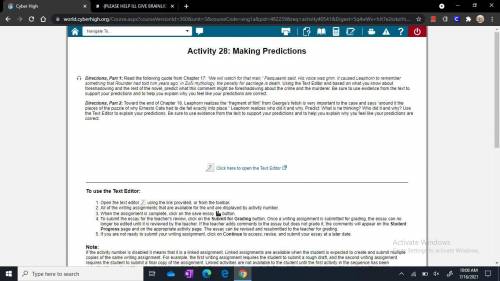
Directions, Part 1: Read the following quote from Chapter 17: “We will watch for that man,” Pasquaanti said. His voice was grim. It caused Leaphorn to remember something that Rounder had told him years ago; in Zuñi mythology, the penalty for sacrilege is death. Using the Text Editor and based on what you know about foreshadowing and the rest of the novel, predict what this comment might be foreshadowing about the crime and the murderer. Be sure to use evidence from the text to support your predictions and to help you explain why you feel like your predictions are correct. Directions, Part 2: Toward the end of Chapter 18, Leaphorn realizes the “fragment of flint” from George’s fetish is very important to the case and says “around it the pieces of the puzzle of why Ernesto Cata had to die fell exactly into place.” Leaphorn realizes who did it and why. Predict: What is he thinking? Who did it and why? Use the Text Editor to explain your predictions. Be sure to use evidence from the text to support your predictions and to help you explain why you feel like your predictions are correct.


Answers: 2
Another question on English

English, 21.06.2019 19:50
Men sample of a metaphor? o a she was as busy as a bee. o b, his room was like a prison. o c. she has a heart of stone, d. she is an uncaring person.
Answers: 1

English, 21.06.2019 21:30
Which phrase best describes roosevelt’s explanation of the german japanese war
Answers: 3

English, 22.06.2019 00:30
In marian anderson sings the author begins the story by putting the reader right in the middle of the action what is the yearn for this type of organization
Answers: 3

English, 22.06.2019 03:40
Read this paragraph from chapter 5 of the prince. there are, for example, the spartans and the romans. the spartans held athens and thebes, establishing there an oligarchy: nevertheless they lost them. the romans, in order to hold capua, carthage, and numantia, dismantled them, and did not lose them. they wished to hold greece as the spartans held it, making it free and permitting its laws, and did not succeed. so to hold it they were compelled to dismantle many cities in the country, for in truth there is no safe way to retain them otherwise than by ruining them. and he who becomes master of a city accustomed to freedom and does not destroy it, may expect to be destroyed by it, for in rebellion it has always the watchword of liberty and its ancient privileges as a rallying point, which neither time nor benefits will ever cause it to forget. and whatever you may do or provide against, they never forget that name or their privileges unless they are disunited or dispersed, but at every chance they immediately rally to them, as pisa after the hundred years she had been held in bondage by the florentines. what idea is stressed in the passage? the desire for liberty the establishment of an oligarchy the dismantling of an acquired state the tendency toward rebellion
Answers: 1
You know the right answer?
Directions, Part 1: Read the following quote from Chapter 17: “We will watch for that man,” Pasquaan...
Questions

Mathematics, 01.04.2021 21:10



Chemistry, 01.04.2021 21:10



Mathematics, 01.04.2021 21:20






Mathematics, 01.04.2021 21:20


World Languages, 01.04.2021 21:20


Spanish, 01.04.2021 21:20



Mathematics, 01.04.2021 21:20



